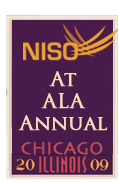NISO/BISG 3rd Annual Forum The Changing Standards Landscape: Creative Solutions to Your Information Problems
About the Forum

Many of the existing standards, workflows and business models for print books need to be reconsidered in an e-book environment. Are you ready?
The market for electronic books has expanded rapidly in the past year. With the release of new readers and ever increasing amounts of new content, it is likely that this growth will continue and expand in the coming years. Many of the existing standards, workflows and business models for print books need reconsideration in an e-book environment. In the third annual meeting hosted by NISO and the Book Industry Study Group (BISG) on the changing standards landscape will focus on important standards initiatives and needs in the e-book marketplace. Segmented to focus on the different stages of creation, distribution and use, this seminar will touch on critical areas of identification, formatting, DRM, and the specific use needs of libraries.

Event Sessions
Introduction and Welcome
Speakers
12:30 p.m. - 12:45 p.m.
The New ISTC Agency: An Emerging Standard
Speaker
12:45 p.m. - 1:05 p.m.:
The New ISTC Agency: An Emerging Standard
A newly approved ISO standard, the International Standard Text Code (ISTC - ISO 21047:2009), provides a means of uniquely and persistently identifying textual works in information systems, and facilitates the exchange of information about these works between every point in the supply chain on an international level. The ISTC makes it possible to group products containing the same content--or even, in some cases, different content with the same origin--together, optimizing their discoverability in search engines and improving collections management and sales & loans analysis. In this presentation, Andy Weissberg will describe the business cases associated with ISTC and how the entire book industry can participate and benefit from this emerging industry standard.
ISBN and E-Books: The Use of ISBN for Electronic Texts
Speaker
1:05 p.m. - 1:30 p.m.:
After nearly 40 years of enjoying the best established and most effective global standard for product identification, the ISBN community is finding it extremely difficult to reach consensus over applying ISBN to ebooks. This presentation will consider the merits of the different positions that are being implemented, and seek to understand the long term implications that a lack of consistency in application might have for the integrity of the ISBN system itself.
Toward a Common E-Book Format Standard: EPUB
Speaker
1:30 p.m. - 1:55 p.m.
Discovering Online Book Content: BISG's BookDROP
Speaker
1:55 p.m. - 2:20 p.m.:
Publishers want to make it as easy as possible for e-books to be discovered, browsed and downloaded by their partners - booksellers, libraries and other e-book suppliers. But they also want to maintain control over the quality of their content. To meet these sometimes conflicting demands, BISG and the Association of American Publishers jointly developed BookDROP, a set of standard HTTP transactions that work between a publisher's digital book archive and the websites of booksellers, libraries and other e-book suppliers. In this presentation, BISG's Michael Healy will describe the unique features of BookDROP along with the benefits of straightforward discoverability across the supply chain.
Break
2:20 p.m. - 2:30 p.m.
eBook DRM - Between Piracy and Open Access
Speaker
2:30 p.m. - 2:55 p.m.:
In a world where readers and librarians expect a great deal of content to be freely accessible on the web, most book publishers have embraced online publishing. That said, very few are signing on for unprotected access to their work. In this talk, Suzanne Kemperman from OCLC NetLibrary will discuss the current book industry DRM practices aiming to strike a balance between free information and publisher survival. Why do book publishers use DRM? Why do some embrace Open Access publishing, while others lock down their content even more securely? The answer to broader access may not be a question of “to DRM or not to DRM”, but one of business models and technology.
Developing an E-book Business Model: Too new for standardization?
Speaker
2:55 p.m. - 3:20 p.m.:
E-book business models are still evolving. Whether it be the outright purchase of individual titles/collections, subscription-based models or short-term rentals, the range of choices can seem daunting. This presentation will summarize the business model alternatives for each broad e-book category: reference, monographs, textbooks, etc., and identify emerging pointers toward standardization in each.
E-books in the Library: Successfully Reaching the End User
Speaker
3:20 p.m. - 3:45 p.m.:
As e-books become more popular in today's library, librarians are discovering challenges in finding the best ways to acquire, catalog, access and read the format. This presentation will describe the e-book standards librarians need in MARC records, cataloging, and purchasing to improve the dissemination of e-book data throughout a library's workflow. It will also unpack the necessary "standard" interface features most requested by end users.
Q&A
3:45 p.m. - 4:00 p.m.
Additional Information
To view the full agenda for the Annual ALA Conference, click here.
Event Dates
–
Location
NISO @ ALA Annual
Friday, July 10, 2009
12:30 p.m. - 4:00 p.m.
Hyatt Regency Chicago, Columbus Hall E/F - Gold Level, East Tower